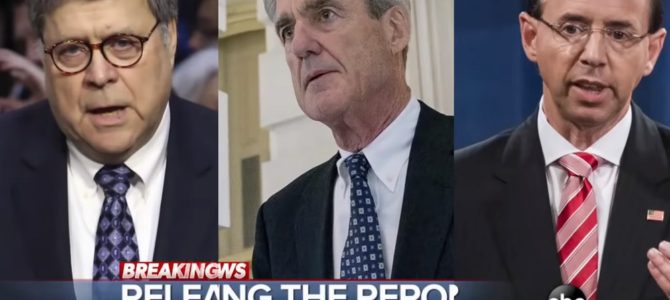The long-awaited report from the Robert Mueller probe into allegations of collusion between the Donald Trump presidential campaign and the Russian government was sent to Attorney General William Barr late Friday. Today, Barr released a letter to ranking members of the overseeing Senate Judiciary Committee, summarizing the confidential report and his agency’s next steps.
You can read the letter below.
https://twitter.com/nickmon1112/status/1109902973205921793?s=19
In at least five places, Barr’s letter says the report clears Trump and his campaign from all charges of treasonous collusion with Russia. Here they are.
1. ‘The Investigation Did Not Establish that Members of the Trump Campaign Conspired or Coordinated with the Russian Government’

“The Special Counsel’s investigation did not find that the Trump campaign or anyone associated with it conspired or coordinated with Russia in its efforts to influence the 2016 U.S. presidential election,” Barr writes. He then quotes the special counsel’s report itself, which says the same thing.
2. ‘Despite Multiple Offers from Russian-Affiliated Individuals,’ Nobody Involved with Trump’s Campaign ‘Conspired or Coordinated with the Russian Government’

Shortly thereafter in the letter, Barr reiterates that “The Special Counsel did not find that the Trump campaign, or anyone associated with it, conspired or coordinated with the Russian government in these efforts, despite multiple offers from Russian-affiliated individuals to assist the Trump campaign.”
3. ‘The Evidence Developed During the Special Counsel’s Investigation Is Not Sufficient to Establish that the President Committed an Obstruction-of-Justice Offense’

‘The Special Counsel…did not draw a conclusion—one way or the other—as to whether the examined conduct [of President Trump] constituted obstruction,” writes Barr. “Instead, for each of the relevant actions investigated, the report sets out evidence on both sides of the question and leaves unresolved what the Special Counsel views as ‘difficult issues’ of law and fact concerning whether the President’s actions and intent could be viewed as obstruction.”
The obstruction of justice charges are largely a matter of prosecutorial discretion, Barr writes, so he and Deputy Attorney General Rod Rosenstein, in consultation with Mueller’s team and a number of federal agencies, decided not to pursue the president on these charges. This decision has nothing to do with the political and legal problems with criminally prosecuting the president, Barr writes, but purely the lack of evidence for obstruction presented in Mueller’s report.
4. ‘The Evidence Does Not Establish that the President Was Involved in an Underlying Crime Related to Russian Election Interference’ 
In discussing his and Rosenstein’s decision not to pursue obstruction charges, Barr writes that part of the reason for declining to do so is because the special counsel failed to find evidence that President Trump had committed an underlying crime triggering an investigation to obstruct.
5. ‘The [Mueller] Report Identifies No [Trump] Actions that…Constitute Obstructive Conduct’

“In cataloguing the President’s actions, many of which took place in public view, the [Mueller] report identifies no actions that, in our judgment, constitute obstructive conduct, had a nexus to a pending or contemplated proceeding, and were done with corrupt intent, each of which, under the Department’s principles of federal prosecution guiding charging actions, would need to be proven beyond a reasonable doubt to establish an obstruction-of-justice offense,” Barr writes.
At the conclusion of the four-page letter, Barr writes that because the Mueller report is of significant public interest, as soon as any classified and legally-protected grand jury information can be swept out of it by his department, he will release as much of it as possible after delivering it to Congress.









